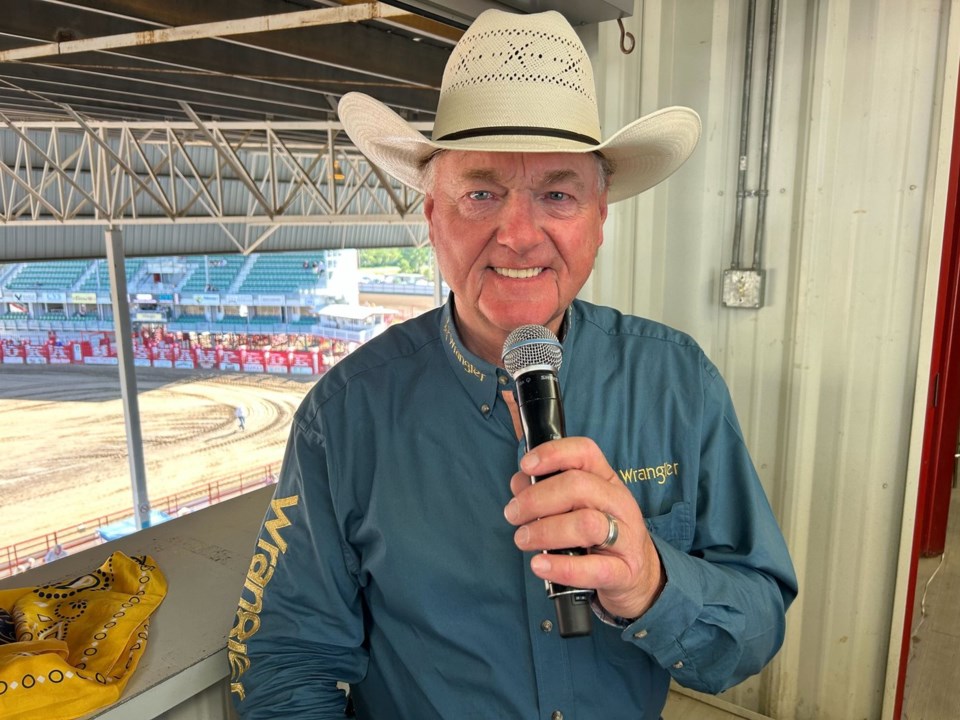PONOKA, ALBERTA — It was August 1983 at the Hand Hills Lake Stampede and Les McIntyre had just fallen out of his chuckwagon.
As he remembers it, McIntyre had made a sharp turn, hit a competitor's wagon and tumbled to the ground at no less than 40 kilometres an hour. When he hit the ground, another wagon following behind hit him, knocking McIntyre out cold and resulting in a career-ending back injury before the age of 30. He spent the next week in a Calgary hospital bed.
"That was the end of that party," says McIntyre, now 71. He'd dreamt as a child to one day compete in the chucks at the Calgary Stampede.
Two years later, just as he was preparing to begin schooling to become an auctioneer, he was asked if he'd be able to call the upcoming chuckwagon races in Trochu, Alta.
"I lied through my teeth and said, 'Oh yeah, you bet.' I'd never called one in my life."
So began a career calling rodeos and chuckwagon races across Alberta, and eventually at the Calgary Stampede -- a career that reaches the 40-year milestone this summer.
"I fell out of a wagon and fell into announcing," says McIntyre, reflecting on his career-ending injury.
"Looking back, it was probably the best thing that ever happened to me."
McIntyre's voice will flood the speakers at GMC Stadium this year for every chuckwagon race at the Calgary Stampede, which begins Friday. It will be his 17th year calling the Stampede after taking up the mantle from legendary Stampede announcer Joe Carberry in 2008.
In doing so, the lifelong resident of Vulcan, Alta., and longtime auctioneer will continue a four-decade-long streak in which he's never missed a job, whether it's for the Greatest Outdoor Show on Earth or an early spring race in northern Alberta. Early in his career, he would call more than 120 chuckwagon races and rodeos per summer, a number that has dropped to about 80 annually.
One of his first lapses came just a few weeks ago when he slept through a morning production meeting in Medicine Hat, Alta. "I missed my first production meeting in 40 years, but I've never missed a performance," he says.
McIntyre credits his longevity to a few key principles. He's never been a smoker and rarely drinks alcohol and coffee, to keep his vocal cords healthy.
As for his natural ability to call such a fast-paced sport, McIntyre says his success is partly owed to his background in auctioneering.
He grew up on a cattle farm and frequently delivered livestock to the High River auction market and Calgary stockyards, where he first witnessed auctioneers at work. He got into the business himself in 1986 after going to auction school in Billings, Mont., and was a livestock auctioneer until 2001.
The career gifted him with the ability to think and speak fast, he says.
"If you never sell anything in your life, I always say the best public speaking and public relations course would be to go to auction school ... They take the shyness out of you."
Every rodeo he calls is slightly different from the other. At the Calgary Stampede, he says, most spectators know little about the sport, so he often provides a brief commentary on the sport's history.
"(Spectators) think, 'What on earth are these coconuts doing out there?'"
He's also more keen in Calgary to explain to spectators what happens when a horse gets injured, or those horses' backgrounds prior to chuckwagon racing. He describes the circuit as "the largest horse rescue society" in Western Canada, as most chuck breeds are retired from horse racing.
"I guarantee you that we can get a horse into the hospital and treat it a lot quicker than you can get a human being into the hospital today," he says.
Explaining the sport isn't a problem at rural rodeos around Alberta such as the Ponoka Stampede, the final prelude to the Calgary Stampede that happens the week before in central Alberta, he says.
"It's not as much explaining in Ponoka," he says.
McIntyre says he has slowed down his life in small ways. He's trimmed his workload in recent years by handing off the early afternoon rodeo job to young announcers. But he believes there's no reason his vocal cords can't last as long as his brain. He credits his wife, Kelly, with keeping him in shape and eating healthy.
And when asked if he plans to quit any time soon, he gives a flat answer: no.
"I think 40 is a good number. Might as well do another 40."
This report by The Canadian Press was first published July 3, 2025.
Matthew Scace, The Canadian Press



